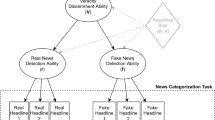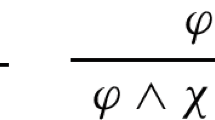Abstract
When people are asked to rate verbal material (texts, statements, and statements forming part of a text) according to informativeness, their judgments will to a large extent depend upon how much they already know about the subject, and how novel the communication is to them. This will in some cases make them stress novelty and in other cases familiarity as the most important determinants for expected or perceived informativeness. It is argued that these apparently contradictory trends are reconcilable by a propositional (subject-predicate) model of information, which presupposes an identifiablesubject of the communication (“what it is all about”), as well as something to be predicated about this subject, topic, or theme. This kind of information structure allows the communication to contain both novel and familiar elements at the same time, with informativeness being at a peak when something quite new and unexpected is told about a familiar subject, or when a new subject is made familiar (i.e., satisfactorily explained) to the person.
Similar content being viewed by others
References
Anderson, J.R. (1976).Language, memory, and thought. Hillsdale, N.J.: Erlbaum.
Anderson, J.R. (1980).Cognitive psychology and its implications. San Francisco: Freeman.
Anderson, J.R. (1981). Concepts, propositions, and schemata: What are the cognitive units?Nebraska Symposium on Motivation, 1980. Lincoln: University of Nebraska Press.
Anderson, J.R., & Bower, G.H. (1973).Human associative memory. Washington: Winston.
Attneave, F. (1959).Applications of information theory to psychology. New York: Holt, Rinehart & Winston.
Baum, R. (1975).Logic. New York: Holt, Rinehart & Winston.
Berlyne, D.E. (1957). Uncertainty and conflict: A point of contact between information-theory and behavior-theory concepts.Psychological Review, 64, 329–339.
Berlyne, D.E. (1960).Conflict, arousal, and curiosity. New York: McGraw-Hill.
Bransford, J.D., & Johnson, M.K. (1972). Contextual prerequisites for understanding: Some investigations of comprehension and recall.Journal of Verbal Learning and Verbal Behavior, 11, 717–726.
Chomsky, N. (1957).Verbal structures. The Hague: Mouton.
Clark, H.H., & Clark, E.V. (1977).The psychology of language. New York: Harcourt, Brace, Jovanovich.
Eaton, R.M. (1959).General logic. New York: Scribner.
Fischhoff, B. (1977). Perceived informativeness of facts.Journal of Experimental Psychology: Human Perception and Performance, 3, 349–358.
Fredericksen, C.H. (1975). Representing logical and semantic structure of knowledge acquired from discourse.Cognitive Psychology, 7, 371–458.
Garner, W.R. (1962).Uncertainty and structure as psychological concepts. New York: Wiley.
Guttenplan, S.D., & Tanny, M. (1971).Logic: A comprehensive introduction. New York: Basic Books.
Haviland, S.E., & Clark, E.V. (1974). What’s new? Acquiring new information as a process in comprehension.Journal of Verbal Learning and Verbal Behavior, 13, 512–521.
Kintsch, W. (1974).The representation of meaning in memory. Hillsdale: N.J.: Erlbaum.
Mandler, J., & Johnson, N. (1977). Remembrance of things parsed: Story structure and recall.Cognitive Psychology, 9, 111–151.
Mowrer, O.H. (1954). The psychologist looks at language.American Psychologist, 9, 600–694.
Neisser, U. (1967).Cognitive psychology. New York: Appleton-Century-Crofts.
Norman, D.A., & Rumelhart, D.E. (1975).Explorations in cognition. San Francisco: Freeman.
Shannon, C.E. (1951). Prediction and entrophy of printed English.Bell Systems Technical Journal, 30, 50–64.
Sluckin, W. (Ed.). (1979).Fear in animals and man. New York: Van Nostrand.
Stebbing, L.S. (1933).A modern introduction to logic. London: Methuen.
Teigen, K.H. (1979a). Informativitet som psykologisk begrep. I: Den subjektive informasjonsverdi i utsagn [Informativeness as a psychological concept. I: The subjective information value in statements].Forskning fra Psykologisk Institutt i Bergen, 10, no. 6.
Teigen, K.H. (1979b). Informativitet som psykologisk begrep. II: Om forholdet mellom kjenthet, informasjonsverdi og interesse [Informativeness as a psychological concept. II: On the relationship between familiarity, information value, and interest].Forskning fra Psykologisk Institutt i Bergen, 10, no. 7.
Teigen, K.H. (1981). “Knowledge by acquaintance” and “knowledge-about”: A psychometrical demonstration.Scandinavian Journal of Psychology, 22, 27–31.
Teigen, K.H., & Ellingsen, G.R. (1979). Informativitet som psykologisk begrep. III: Når er gammelt nytt godt nytt? [Informativeness as a psychological concept. III: When is old news good news?].Forskning fra Psykologisk Institutt i Bergen, 10, no. 8.
Wolf, A. (1930).Textbook of logic. London, Unwin.
Author information
Authors and Affiliations
Additional information
This article was written when the author was on sabbatical leave at the University of Leicester.
The study was supported by a grant from the Norwegian Research Council for Science and the Humanities.
Rights and permissions
About this article
Cite this article
Teigen, K.H. Perceived informativeness of verbal information. Current Psychology 4, 3–16 (1985). https://doi.org/10.1007/BF02686561
Accepted:
Published:
Issue Date:
DOI: https://doi.org/10.1007/BF02686561




